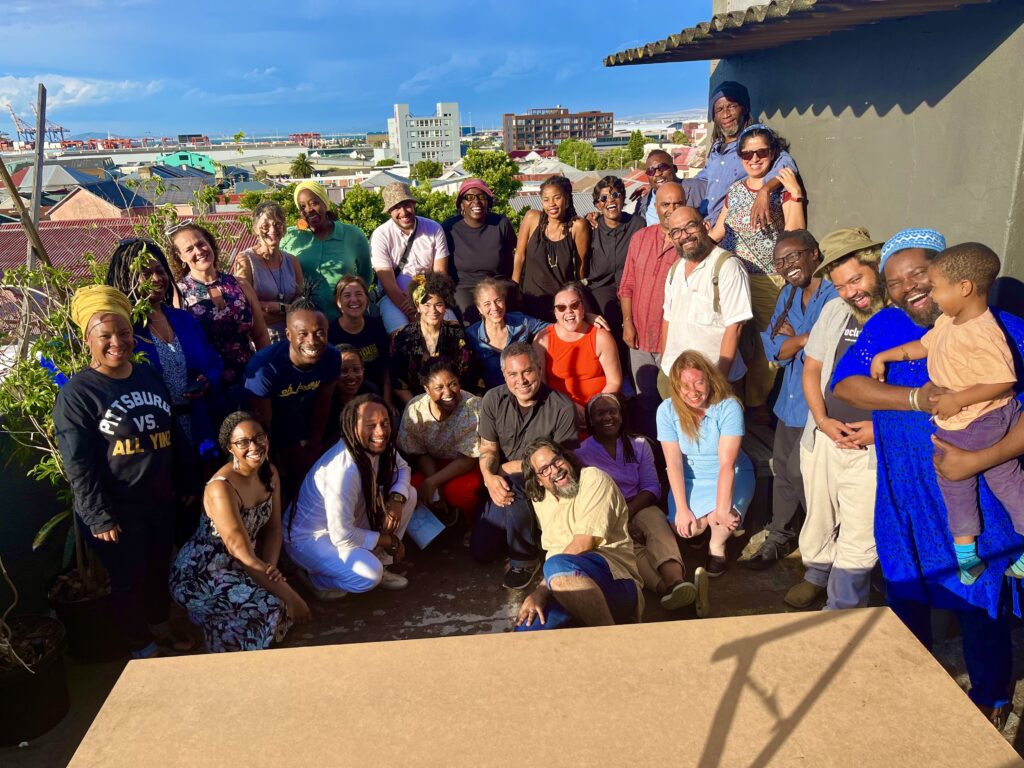A Workshop in Radically Humanist Praxis
Date
Dec 12-15, 2022Organized by
Kamari Clarke, Kelly Gillespie and Deborah ThomasLocation
The Chimurenga Factory, Cape Town, South AfricaParticipants
- Su’ad Abdul Khabeer University of Michigan, Ann Arbor, USA
- Donna Auston Wenner-Gren Foundation, USA
- Lucia Cantero Claremont Graduate University, USA
- Ruchi Chaturvedi University of Cape Town, South Africa
- Kamari Clarke University of Toronto, Canada
- Victoria Collis-Buthelezi University of Johannesburg, South Africa
- Jason De León University of California, Los Angeles, USA
- Justin Dunnavant University of California, Los Angeles, USA
- Ntone Edjabe Chimurenga, South Africa
- Divine Fuh University of Cape Town, South Africa
- Kelly Gillespie University of the Western Cape, South Africa
- Karelle Hall Rutgers University, USA
- Ryan Jobson University of Chicago, USA
- Aja Lans Harvard University, USA
- Nosipho Mngomezulu University of the Witwatersrand, South Africa
- Wayne Modest Wereldmuseum, Netherlands
- Julie Nxadi Writer, South Africa
- Suren Pillay University of the Western Cape, South Africa
- Kwame Otu University of Virginia, USA
- Lesego Rampolokeng Poet, South Africa
- Ciraj Rassool University of the Western Cape, South Africa
- Danilyn Rutherford Wenner-Gren Foundation, USA
- Savannah Shange University of California, Santa Cruz, USA
- Audra Simpson Columbia University, USA
- Tendayi Sithole University of South Africa, South Africa
- Marlon Swai University of Cape Town, South Africa
- Deborah Thomas University of Pennsylvania, USA
- Ahmed Veriava University of the Witwatersrand, South Africa
- Rachel Watkins American University, USA
- Leniqueca Welcome George Washington University, USA
ORGANIZER’S STATEMENT: This workshop is conceptualized as a consideration of the problem of humanism, its inheritance into the humanities and social sciences, and the possibilities or limits of expanding its archive and repertoire. In particular, we are interested in bringing the work of critical Black and Indigenous Studies and the contemporary turns in the anti/decolonial intellectual lineages to bear on the question of the human at the heart of anthropology and of the humanities.
As we continue to contend with the deep inequities surrounding the global pandemic, and as our institutions continue to reckon with ongoing forms of anti-Black violence and related forms of discrimination and exclusion, the work of social change continues. The aim of this seminar – a new format for Wenner-Gren – is to bring together some of the discipline’s most innovative scholars on this topic to revisit and consolidate some of the conversations that have developed, and to generate a set of “guiding principles” that will help to chart a new course for the discipline. In keeping with the forward-looking aims of this new program, this will be an intergenerational conversation, bringing together anthropologists at different stages in their career. We are inviting participants to convene for three days to interrogate principles and priorities in the articulation of a decolonizing anthropology for the 21st century, and in so doing, to broker new solidarities towards future collaborations and coalitions.
The academic organizers are Kamari Clarke (University of Toronto/UCLA), and Deborah Thomas (University of Pennsylvania), and Kelly Gillespie (University of the Western Cape). The seminar is designed to continue conversations initiated in a series of online webinars, “Toward a Radically Humanist Anthropology,” that was hosted by Wenner-Gren, in 2021. These conversations emerged in response to Ryan Jobson’s 2019 year-in-review essay for American Anthropologist, “The Case for Letting Anthropology Burn.” Through our various collaborations we have been envisioning what a radically humanist anthropology might look like, one that is grounded in a praxis of equality and a notion of being and becoming that moves us beyond the conceptualization of a liberal subject that is knowable and reducible to cultural units and ethnographic data. The intention will be to imagine new horizons for the discipline and insist that anthropology be done in the service of real-time material, affective, and ideological transformations.
Each day of the workshop will be oriented around a broad theme: Method, Knowledge Production, and Representation. We will attend to these themes through a range of interventions, including individual provocations in different forms and genres, plenary discussions, collective reading and writing work, and engagements with the urban context in which we will be meeting. Participants will prepare original contributions across a range of forms: performance pieces, exhibits, syllabi presentations, as well as conventional papers. We imagine this workshop as a collective effort in setting some new – or renewed – orientations for intellectual work.
